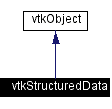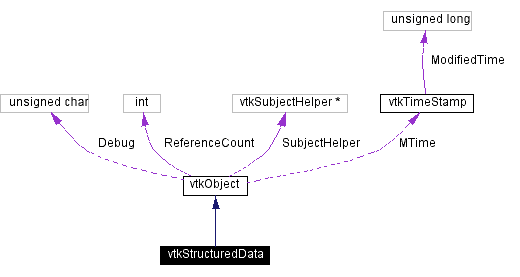
#include <vtkStructuredData.h>
Inheritance diagram for vtkStructuredData:


Public Methods | |
| virtual const char * | GetClassName () |
| virtual int | IsA (const char *type) |
Static Public Methods | |
| vtkStructuredData * | New () |
| int | IsTypeOf (const char *type) |
| vtkStructuredData * | SafeDownCast (vtkObject *o) |
| int | GetDataDimension (int dataDescription) |
| void | GetPointCells (vtkIdType ptId, vtkIdList *cellIds, int dim[3]) |
| int | SetDimensions (int inDim[3], int dim[3]) |
| int | SetExtent (int inExt[6], int ext[6]) |
| void | GetCellPoints (vtkIdType cellId, vtkIdList *ptIds, int dataDescription, int dim[3]) |
| void | GetCellNeigbors (vtkIdType cellId, vtkIdList *ptIds, vtkIdList *cellIds, int dim[3]) |
| vtkIdType | ComputePointId (int dim[3], int ijk[3]) |
| vtkIdType | ComputeCellId (int dim[3], int ijk[3]) |
Protected Methods | |
| vtkStructuredData () | |
| ~vtkStructuredData () | |
vtkStructuredData is an abstract class that specifies an interface for topologically regular data. Regular data is data that can be accessed in rectangular fashion using an i-j-k index. A finite difference grid, a volume, or a pixmap are all considered regular.
Definition at line 69 of file vtkStructuredData.h.
|
|
Definition at line 119 of file vtkStructuredData.h. |
|
|
Definition at line 120 of file vtkStructuredData.h. |
|
|
Create an object with Debug turned off, modified time initialized to zero, and reference counting on. Reimplemented from vtkObject. |
|
|
Return the class name as a string. This method is defined in all subclasses of vtkObject with the vtkTypeMacro found in vtkSetGet.h. Reimplemented from vtkObject. |
|
|
Return 1 if this class type is the same type of (or a subclass of) the named class. Returns 0 otherwise. This method works in combination with vtkTypeMacro found in vtkSetGet.h. Reimplemented from vtkObject. |
|
|
Return 1 if this class is the same type of (or a subclass of) the named class. Returns 0 otherwise. This method works in combination with vtkTypeMacro found in vtkSetGet.h. Reimplemented from vtkObject. |
|
|
Will cast the supplied object to vtkObject* is this is a safe operation (i.e., a safe downcast); otherwise NULL is returned. This method is defined in all subclasses of vtkObject with the vtkTypeMacro found in vtkSetGet.h. Reimplemented from vtkObject. |
|
||||||||||||
|
Specify the dimensions of a regular, rectangular dataset. The input is the new dimensions (inDim) and the current dimensions (dim). The function returns the dimension of the dataset (0-3D). If the dimensions are improperly specified a -1 is returned. If the dimensions are unchanged, a value of 100 is returned. |
|
||||||||||||
|
Specify the dimensions of a regular, rectangular dataset. The input is the new dimensions (inDim) and the current dimensions (dim). The function returns the dimension of the dataset (0-3D). If the dimensions are improperly specified a -1 is returned. If the dimensions are unchanged, a value of 100 is returned. |
|
|
Return the topological dimension of the data (e.g., 0, 1, 2, or 3D). Referenced by vtkStructuredGrid::GetDataDimension(), vtkRectilinearGrid::GetDataDimension(), and vtkImageData::GetDataDimension().
|
|
||||||||||||||||||||
|
Get the points defining a cell. (See vtkDataSet for more info.) Referenced by vtkRectilinearGrid::GetCellPoints(), and vtkImageData::GetCellPoints().
|
|
||||||||||||||||
|
Get the cells using a point. (See vtkDataSet for more info.) Referenced by vtkStructuredGrid::GetPointCells(), vtkRectilinearGrid::GetPointCells(), and vtkImageData::GetPointCells().
|
|
||||||||||||||||||||
|
Get the cells using the points ptIds, exclusive of the cell cellId. (See vtkDataSet for more info.) |
|
||||||||||||
|
Given a location in structured coordinates (i-j-k), and the dimensions of the structured dataset, return the point id. Definition at line 107 of file vtkStructuredData.h. Referenced by vtkRectilinearGrid::ComputePointId(), and vtkImageData::ComputePointId().
|
|
||||||||||||
|
Given a location in structured coordinates (i-j-k), and the dimensions of the structured dataset, return the cell id. Definition at line 114 of file vtkStructuredData.h. Referenced by vtkRectilinearGrid::ComputeCellId(), and vtkImageData::ComputeCellId().
|
 1.2.11.1 written by Dimitri van Heesch,
© 1997-2001
1.2.11.1 written by Dimitri van Heesch,
© 1997-2001